By Nr Chinonso Cynthia Ukah. BNSc, RN, RM, RPHN. Freelance Health Writer. Medically reviewed by: Dr. K.T. Craig, MBBS, MPH.
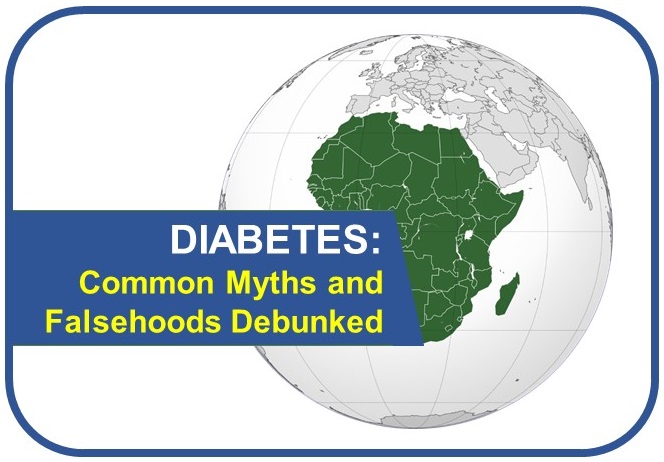
With about 34.2 million patients expected to have diabetes by the year 2040, [1] it is natural to be inquisitive about the causes and prevention of the disease.
In sub-Saharan Africa, where it is common practice to pass on health knowledge traditionally through generations, by word of mouth , we often find ourselves holding onto beliefs about causes and prevention of diabetes that are mythical or not scientifically accurate (misconceived).
These myths and misconceptions in turn, impact how we manage or perceive this serious health condition.
Let's explore some of the most persistent myths and falsehoods (misconceptions) about diabetes in our region and uncover the science-based facts to replace them.
10 Myths and Falsehoods about Diabetes in Sub-Saharan Africa

Sugar being poured into a bowl of porridge. Sugar does not directly cause diabetes, Image credit: Freepik
This is not true!
It is generally thought that sugar causes diabetes because people with untreated diabetes frequently pass sugary urine.
When someone has untreated diabetes, their body cannot effectively process glucose (sugar) due to insufficient insulin or insulin resistance.
This results in excess glucose being passed in urine and creates the falsehood (misconception) that sugar intake caused the condition.
In reality, sugar exists in two primary forms: refined and complex.
Eating refined sugar does not directly cause diabetes. But excessive consumption can increase your risk of developing type 2 diabetes because of its role in rapid weight gain.
You therefore need to be mindful of your sugar intake.
The WHO recommends that everyone should limit their free sugar intake to less than 5 -10% of daily calories, that is, about 12 teaspoons (48 grams of sugar) per person per day. Children and women are advised to consume even less - about 6 teaspoons of sugar (25 grams) per day. [2]
The misconception that sugar causes diabetes has led some people to consume bitter foods and herbs, some of which are harmful, believing these can dilute sugar in their bodies.
The truth is that managing diabetes requires an approach that involves diet, exercise, and often medical intervention.
.jpg)
A black man opening the door to a luxury car with an airplane in te background. It is a myth that only the rich get diabetes.
This is not true!
Diabetes can affect anyone, regardless of whether they are rich or poor. In fact, there has been a rise in the number of poor people developing diabetes in Africa recently. [3]
The idea that diabetes only happens to wealthy individuals is harmful and incorrect. Poverty does not protect people from getting this condition since factors like obesity, unhealthy diets, and lack of exercise, which are common across different income levels in Africa, increase one's risk of diabetes.
The truth is, if you’re poor and cannot afford nutritious foods, eating cheap, processed foods is equally bad for your health and can aid your developing diabetes.
The real challenge is that when you have diabetes, it is often very expensive to manage. [3] So prevention is cheaper than the cure.
As diabetes does not discriminate based on wealth, having the right resources and support to prevent and properly manage the condition matters.
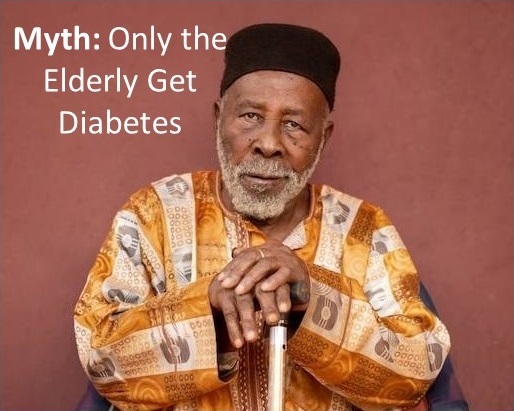
An elderly African man. It is a myth that diabetes affects only the elderly.
This is not true!
Diabetes can develop at any age, not just in older individuals. Both young and old alike can be affected.
There are 2 types of diabetes: Type 1 diabetes often develops during childhood/adolescence, while Type 2 diabetes can occur at any time in one's life, but more commonly in adults, hence it is often referred to as ‘adult-onset diabetes’. In fact, as you age towards 65 years old, your chances of getting diabetes actually increase.
It's important to note that older adults with diabetes do face the highest rates of major complications like lower-limb amputations, heart attacks, vision loss, and kidney failure compared to other age groups. This however does not mean that diabetes exclusively affects the elderly.
The reality is that diabetes is an equal opportunity disease - it does not discriminate based on age. Anyone can develop this condition, young or old.

It is a myth that diabetes is not a serious disease.
This is not true!
Diabetes is a very serious and life-threatening condition, if not properly managed. It requires constant monitoring and care to prevent severe and debilitating complications which include but not limited to:
Truth is, diabetes requires diligent management through medication, dietary changes, exercise, and regular monitoring.
Ignoring or downplaying the seriousness of this condition can have devastating consequences for one's health and quality of life.
Myth 5: Type 1 diabetes is more serious than type 2 diabetes
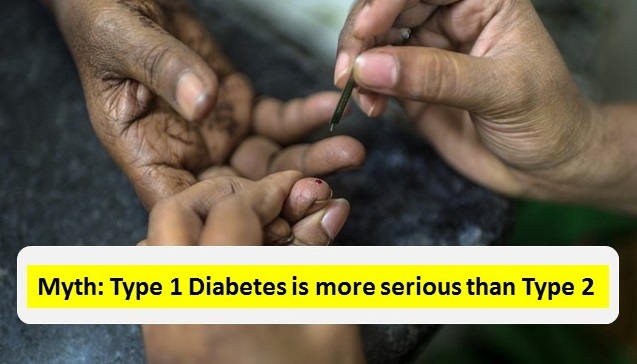
Both Type 1 and Type 2 diabetes are serious diseases depending on several factors
This is not accurate!
Both type 1 and type 2 diabetes are very serious diseases.
They require careful management to avoid the severe complications that come with their untreated forms.
The seriousness of either type 1 or type 2 diabetes depends on factors like how well they are controlled and how well the affected patient complies with their various treatments, not on the specific type of diabetes.
For instance, an old man with type 1 diabetes who forgets to take his insulin shots is at risk of developing several complications of the disease such as vision problems, diabetic ketoacidosis, etc.
This is also the same for a young man with type 2 diabetes that refuses to take his oral medications. Both of them will go down with serious complications.
Nevertheless, there are important differences between type 1 and type 2 diabetes. And both forms have major impacts on a person's health if not properly treated.
We must recognize the significance of diabetes if diagnosed and take the necessary steps to manage the condition effectively, regardless of whether it is type 1 or type 2.
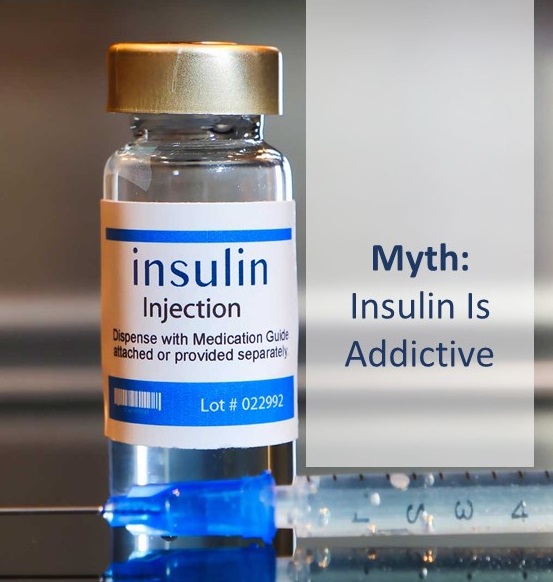
A bottle of insulin with syring on a table. It is myth that insulin is addictive.
This is false!
Insulin is a hormone (special chemical substance) made by the pancreas, which functions in getting the glucose in our blood into our body cells, to be used for energy.
In diabetes, the pancreas isn't producing enough insulin needed for this role, as is the case in type 1 diabetes.
Insulin, as injections for the treatment of diabetes was initially obtained - from animals, typically pigs and cattle. A better form was discovered in 1978 using E. coli bacteria. It is a necessary medication for managing diabetes, and even though it may be used many times, it is not addictive. [4]
Some people might require less insulin with lifestyle changes, while others might need adjustments based on their specific health journey.
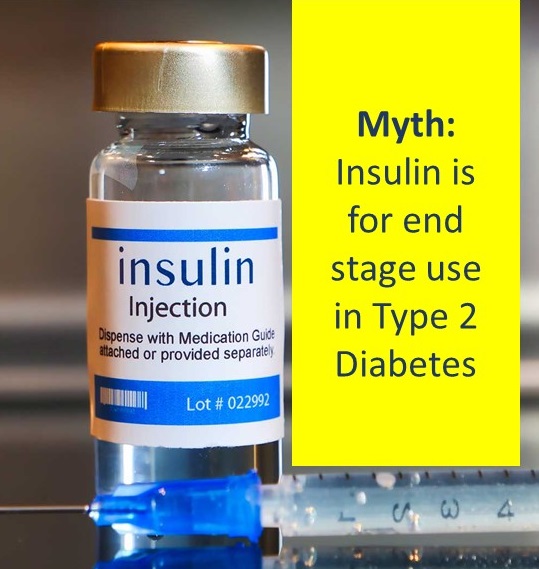
It is a myth that insulin therapy is for end stage use in Type 2 diabetes.
This is not correct!
Starting insulin therapy does not mean a person with type 2 diabetes has reached the final stages of the condition.
Insulin is often introduced at various points in the disease progression to help control blood sugar levels well and this is often temporary and patients can revert to their oral medications as appropriate.
For example when a diabetic has infection, control of the glucose level may become difficult with oral drugs and so insulin is used to temporarily effect a better control.
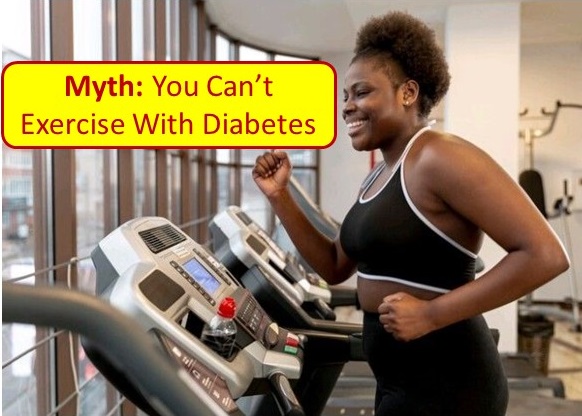
Exercise is an important part of diabetes management.
This is untrue!
People with diabetes can and should participate in regular physical activity and athletics.
Exercise is an essential part of managing both type 1 and type 2 diabetes.
Doctors may prescribe a lower insulin dosage before exercise because exercise can also lower blood sugar levels.
There are instances where diabetics who engage in athletics or exercise can become hypoglycemic i.e. (have a very low blood sugar level).
Here are some precautions to take to prevent hypoglycemia during exercise:
With the above precautions, you can safely engage in a wide range of sports and fitness activities.
Many professional athletes and Olympic champions have successfully managed their diabetes while competing at the highest levels of their sport careers. An example is Gary Hall Jr, the first Olympic athlete with type 1 diabetes to win a gold medal. [5]
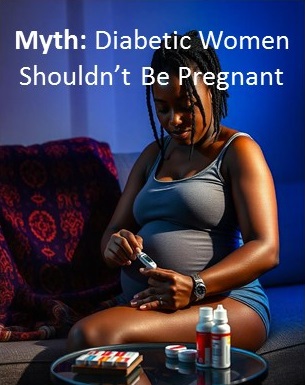
With proper care, women with diabetes can have safe pregnancies and delivery.
This is false!
Women with diabetes can have safe and healthy pregnancies.
Diabetes in pregnancy whether it develops during pregnancy (gestational) or was present beforehand (pregestational) can be effectively managed with:
The care that is needed by pregnant mothers living with diabetes is a challenge in sub-Saharan Africa.
In these regions, limited healthcare resources are often focused on preventing conditions like mother-to-child transmission of HIV, leaving fewer resources for diabetes management during pregnancy.
This shouldn't scare you away from your desire of getting pregnant if you're a woman living with diabetes in these regions.
It is important that you get the right healthcare in a good health centre, clinic or hospital.
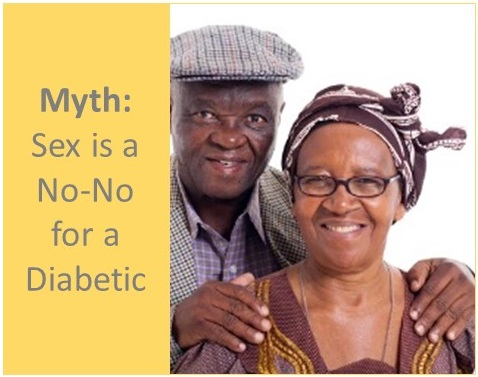
Nothing stops diabetics from having a healthy sex life.
This is completely untrue!
Diabetes is a non-communicable disease and not a sexually transmitted disease, hence it does not prevent people from having a normal, healthy sex life.
Of course, there may be times when diabetes-related factors like neuropathy, circulatory issues, or medication side effects may require some adjustments or accommodations in the bedroom and in one's sex life and preferences.
An active and satisfying sexual intimacy is important for our overall well-being.
It helps foster emotional closeness, reduces stress, and promotes a positive quality of life - all of which are beneficial for someone managing a chronic condition like diabetes.
All that is needed is maintaining open communication and flexibility with your partner so you can continue to enjoy a fulfilling sex life.
No longer should diabetes be seen as a disease of the rich or one that affects older people. It is an equal opportunity disease that can impact people of all ages and socioeconomic backgrounds. And even though diabetes requires serious, lifelong management, it does not mean an end to normal, healthy activities like exercise, pregnancy, or an active sex life.
We can transform how diabetes is perceived in our communities with the right knowledge and support. All you have to do is, have an open dialogue with your doctor, share your concerns, and work with them to develop an effective care plan for you.
Only then can we truly dispel the myths and provide the comprehensive support needed to thrive with diabetes.
1. Pastakia SD, Pekny CR, Manyara SM, Fischer L. Diabetes in sub-Saharan Africa - from policy to practice to progress: targeting the existing gaps for future care for diabetes. Diabetes Metab Syndr Obes. 2017;10:247-263. doi: 10.2147/DMSO.S126314. Available from here.
2. World Health Organization Regional Office for the Eastern Mediterranean. Reducing sugar consumption to prevent and control noncommunicable diseases in the Eastern Mediterranean Region [Internet]. World Health Organization; 2022. Available from here.
3. Diabetes is a fast-growing disease of the poor. Here's how we can turn the tide [Internet]. World Economic Forum; 2017. Available from here.
4. Diabetes Dialogues: The History of a Wonderful Thing We Call Insulin [Internet]. American Diabetes Association; 2019. Available from here.
5. Not Just A Patch. Professional athletes with type 1 diabetes wearing CGM [Internet, n.d.]. Cited 2024 Dec 3. Available from here.
Related:
Type 1 Diabetes Mellitus: An Explainer for Africans
Type 2 Diabetes: What Africans Need to Know
Diabetes in Pregnancy in Sub-Saharan Africa: An Overview
You May Have Prediabetes and Not Know. How to Find Out (Tips)
Herbal Treatment of Diabetes in Sub-Saharan Africa: Is it real?
Management of Type 2 Diabetes in Nigeria
Published: December 16, 2024
© 2024. Datelinehealth Africa Inc. All rights reserved.
Permission is given to copy, use and share content freely for non-commercial purposes without alteration or modification and subject to source attribution.
DATELINEHEALTH AFRICA INC., is a digital publisher for informational and educational purposes and does not offer personal medical care and advice. If you have a medical problem needing routine or emergency attention, call your doctor or local emergency services immediately, or visit the nearest emergency room or the nearest hospital. You should consult your professional healthcare provider before starting any nutrition, diet, exercise, fitness, medical or wellness program mentioned or referenced in the DatelinehealthAfrica website. Click here for more disclaimer notice.